Obituary
About Andrew Cusack
 Writer, web designer, etc.; born in New York; educated in Argentina, Scotland, and South Africa; now based in London.
Writer, web designer, etc.; born in New York; educated in Argentina, Scotland, and South Africa; now based in London. read more
News
Blogs
Reviews & Periodicals
Arts & Design
World
France
Mitteleuropa
Knickerbockers
Argentina
The Levant
Africa
Cape of Good Hope
Netherlands
Scandinavia
Québec
India
Muscovy
Germany
Academica
Mrs Evelyn Pelosi
I’ve only just heard of the death of Mrs Evelyn Pelosi, who departed this life at the end of last month.
Evelyn was piously devoted to the traditional liturgy of the Church and was a stalwart of the SSPX’s Edinburgh congregation — but she never stood in the way of houseguests attending the FSSP (or even the Novus Ordo!).
Her mischievous deadpan sense of humour was deployed to excellent effect in her occasional role as gypsy fortuneteller at festive events organised by the South Edinburgh Conservatives in the 1990s.
Another hat she wore was Convenor of the Monarchist League of Scotland (an entity whose events attracted a curious clientele) and from an early age she had a great devotion to South Africa where she visited me in Stellenbosch and introduced me to friends in the pro-life movement in Cape Town.
In the Seventies and Eighties, whenever she thought journalists in the Caledonian dailies were too forgiving of occasional terrorist outrages by the ANC their editorial offices frequently found themselves in receipt of a letter signed by Mrs E. Pelosi, Friends of Christian South Africa.
Mangosutho Buthelezi was among the many well-wishers whose cards could be found overflowing on the chimneypiece of her home in the Mayfield Road.
I remember watching the premier of the television version of Alexander McCall Smith’s “The No. 1 Ladies’ Detective Agency” at her’s there on Easter Sunday evening in 2008 — an Edinburgh/Southern Africa crossover event if ever there was one.
She was amused but dignified when another woman of her marital surname (but radically different views) ascended the political scene across the Atlantic, but for anyone who knew her Evelyn will always be the only Mrs Pelosi.
May she rest in peace.
Msgr Antony Conlon
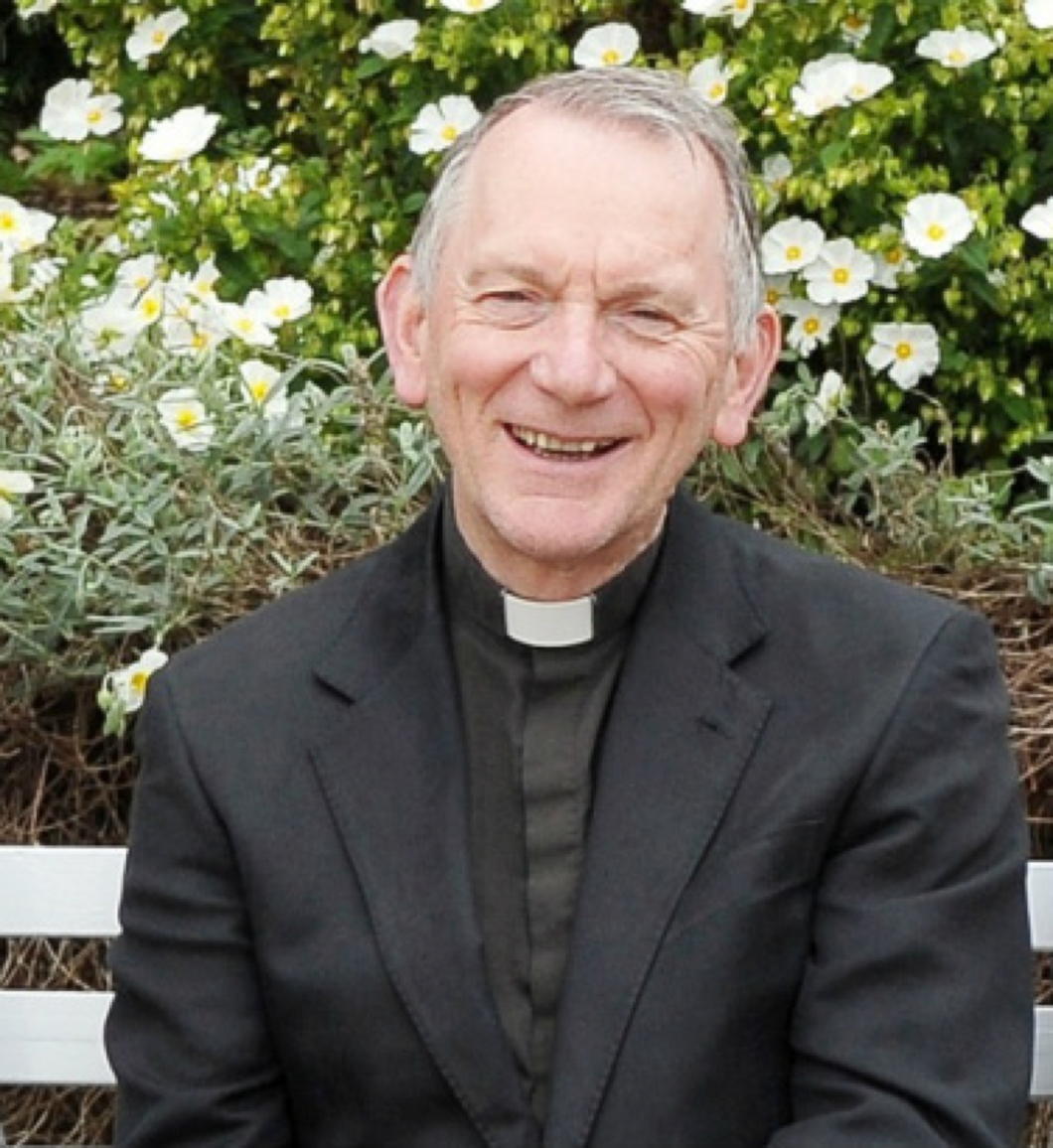
IN PREPARING these notes the same response was given by many of Dr Antony Conlon’s friends – “I’ve got lots of stories, but they’re not really suitable for an obituary”. This is in itself an obituary, as it sums up Antony Conlon’s profound sense of fun and friendship; without ever being in the slightest scandalous, yet often hilarious, anecdotes of him are intensely personal. One of his informal nicknames among many of his friends in conversation (more about the other one later) was ‘our mutual friend’ – one knew immediately who was meant, and it reflects his wonderful ability to bring his friends together; there was nothing solitary about Antony Conlon, he lived through and for people.
This quality of openness, while sometimes misunderstood by those who seek clerical detachment in their priests, was an essential part of his priesthood, one which made him deeply pastoral at all times in the everyday world. There was no ‘off-duty Conlon’, even in his lightest moments the same priestly and paternal respect for others was always there, which, paradoxically, attracted non-Catholics to him so readily. His educated and amusing conversation on the widest spectrum of subjects, rarely ‘churchy’, opened the door to everyone.
As one friend said recently, there was never a telephone call, however serious or sad the initial subject, which at some point did not descend (ascend?) to peals of childlike laughter. Even his well-known indignation and fury with those people and institutions he did not agree with (usually because they were opposed to the traditions of the Church or another firmly-held principle) for all their bluster, and the occasional swear-word, were never unkind, and never quite lost sight of human absurdity. (more…)
Portsmouth Pachyderm
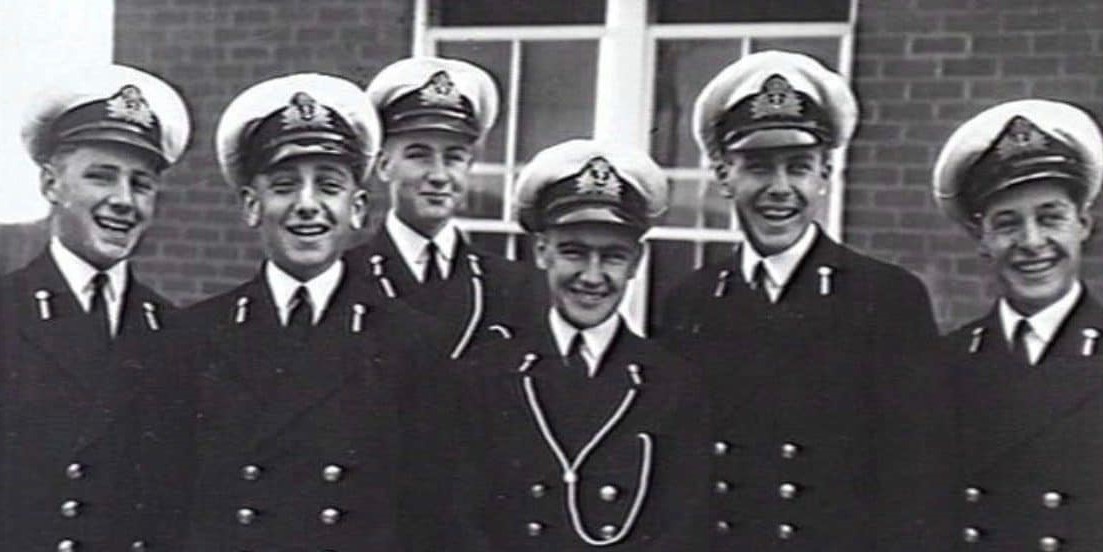
Leach (centre) on being made cadet captain at the Royal Australian Naval College in 1944
A delightful episode is relayed in the Daily Telegraph’s obituary of the late Vice-Admiral David Leach of the Royal Australian Navy.
Leach was the last RAN Chief of Naval Staff to have served in the Second World War but the incident in question dates from the 1950s when he was at the gunnery school in Whale Island in Portsmouth Harbour here in England:
In 1955 he was the course officer for a class of sub-lieutenants who decided to have some fun on their last morning parade, on April 1, by bringing a circus elephant on to the island. The duty officer, warned of the elephant’s approach by the bridge sentry, thought that his leg was being pulled and gave the order to let the pachyderm proceed.
Subsequently the class marched on to the parade ground with the elephant in their midst, surmounted by a mahout dressed as a sub-lieutenant. The beast, being well-trained, picked up the band’s marching step nicely, but Captain “Bunjey” Rutherford, the saluting officer in command of Whale Island, was not amused.
Leach had not been party to the April Fool’s joke, but later that morning, when he took the class results to the captain, he had placed Sub-Lieutenant L E Fant at the top. Rutherford was still not amused, demanding “Fant? Fant? Who’s this feller, Fant?” When the news reached the Admiralty, the Second Sea Lord took a personal interest and called Rutherford to announce, somewhat unkindly: “This is a trunk call.”
R.I.P.
Angela Wrapson
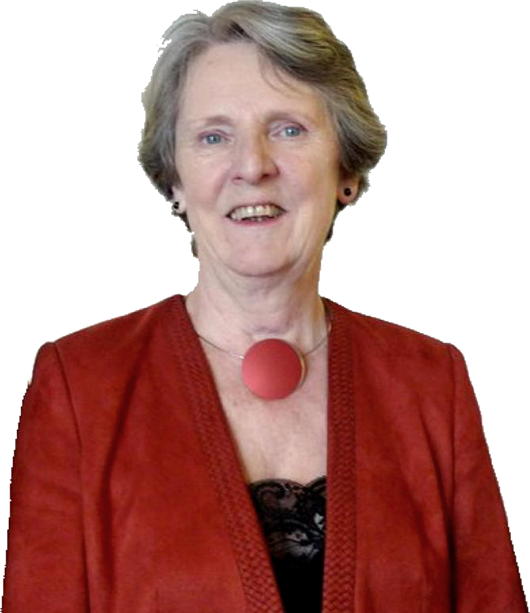
In Rome the other week I was sorry to hear from a mutual friend that Angela Wrapson had died. She had been fighting cancer for a while, but she was quite a fighter and was one of those people you thought would always go on.
Angela was, amongst many things, a fixture of that strange yet familiar galaxy known as the Scottish arts world. She was, for example, director of the Stanza poetry festival for some years.
She was a keen listener, a good conversationalist, and a very welcoming hostess in the wing of Brunstane House that she and her husband George bought back in the 1970s.
From 2015 to 2017, George was the MP for East Lothian and I am still ashamed in those two years I never managed to reciprocate Angela and George’s hospitality by having them round.
Nonetheless, I was pleased to see she got the plaudits she deserved with obituaries in the Scotsman, the Times, and the Herald.
May she rest in peace.
Andrew Graham-Yooll

A giant of Argentine journalism died this summer: Andrew Graham-Yooll.
Born in Buenos Aires early in 1944 to a Scottish father and an English mother, Graham-Yooll made his name at the premier institution of Anglo-Argentina, the now-defunct daily Buenos Aires Herald which he joined aged 22 in 1966.
“The Herald newsdesk supped for Dutch courage a local brandy,” the Times notes, “supplemented with a pâté that Graham-Yooll made of goose livers lashed with gin. A chain-smoker, he would construct tiny houses from matchsticks.”
As the Herald’s news editor during Isabel Perón’s presidency he published the names of dissidents who had gone missing or “disappeared” and, more bravely, continued to do so after Señora Perón was succeeded by a military junta.
The new rulers, who Borges warmly welcomed as “gentlemen”, put Graham-Yooll on trial for publishing interviews with the guerrillas who were terrorising the country. He was acquitted, but accepted the gentle advice of the judge who suggested he might find existence more comfortable outside the borders of the Argentine Republic.
Graham-Yooll continued writing for the Daily Telegraph and Guardian in Great Britain but made a brief foray home in 1982 during the Falklands War before being permanently welcomed home by a democratic government in 1984. Ten years later he was appointed editor of the Herald.
“Things you think you can rely on and trust are just not there,” Graham-Yooll said in Edinburgh when picking up his OBE in 2002.
“You can’t trust the bank, you can’t trust the post office or the people who sell you a house. You can’t trust the politicians, obviously. It’s a friendly society but it lacks strict rules. It’s evil, but it is also attractive to live in a place where you don’t have to live by rules.”
“I don’t know where I could go now. It was always home, even in the worst days, and it still is.”
Dempsey Heiner (1927–2008)
THIS MONTH IT’S already three years since the death of dear Dempsey Heiner, who went to his eternal reward on 16 January 2008. Demspey was a real gem of a man: a scholar and a gentleman, capable of relaying brilliant insights easily and who, at least once, exhibited his skill in the art of the gentlest intellectual rebuke of a presumptuous young intellectual fellow-Catholic (i.e.: yours truly), backed up with a remembered citation of François Mauriac.
Dennis Clinton Graham Heiner was born in New York in 1927 to Robert Graham Heiner and Frances Eliot Cassidy, friends and fellow-travellers of Margaret Sanger, the notorious racial eugenicist & founder of Planned Parenthood. Dempsey’s parents enrolled him at St. Bernard’s, where he was in the same year as George Plimpton, the founder of the Paris Review and twentieth-century embodiment of the gilded amateur. Plimpton (who died in 2003) described Dempsey as “the brightest boy in the class, a genius” and remarked that since leaving school he remained something of an enigma. (more…)
Thomas Molnar, 1921–2010
The Catholic philosopher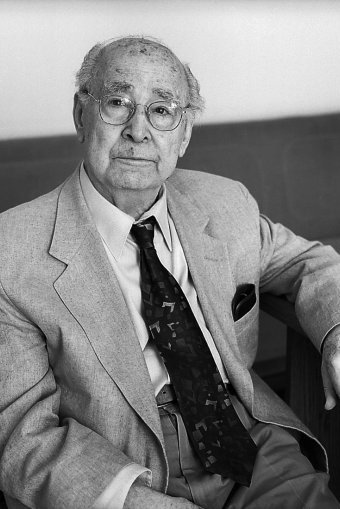 and historian Thomas Molnar died last week in Virginia at eighty-nine years of age, just six days short of reaching his ninetieth year. Born Molnár Tamás in Budapest in 1921, the only son of Sandor and Aranka, Molnar was schooled across the Romanian border in the town of Nagyvárad (Rom.: Oradea) in the Körösvidék, a region often included in Transylvania and an integral part of Hungary until the Treaty of Trianon cleaved it a year before. In 1940 he moved to Belgium to begin his higher education in French, and as a leader in the Catholic student movement he was interned by the German occupiers and sent to Dachau. With the end of hostilities, he returned to Brussels before arriving home in Budapest to witness the gradual Communist takeover of Hungary.
and historian Thomas Molnar died last week in Virginia at eighty-nine years of age, just six days short of reaching his ninetieth year. Born Molnár Tamás in Budapest in 1921, the only son of Sandor and Aranka, Molnar was schooled across the Romanian border in the town of Nagyvárad (Rom.: Oradea) in the Körösvidék, a region often included in Transylvania and an integral part of Hungary until the Treaty of Trianon cleaved it a year before. In 1940 he moved to Belgium to begin his higher education in French, and as a leader in the Catholic student movement he was interned by the German occupiers and sent to Dachau. With the end of hostilities, he returned to Brussels before arriving home in Budapest to witness the gradual Communist takeover of Hungary.
Molnar left for the United States, where he earned his Ph.D. from Columbia University in 1950. He frequently contributed to the pages of National Review after its foundation by William F. Buckley in 1955, and his periodic writings were often found in Monde et Vie, Commonweal, Modern Age, Triumph, and other journals. From 1957 to 1967 he taught French & World Literature at Brooklyn College before moving on to become Professor of European Intellectual History at Long Island University. In 1969 he was a visiting professor at Potchefstroom University in the Transvaal. In 1983 he was awarded an honorary doctorate by the University of Mendoza in Argentina while he was a guest professor at Yale. After the fall of the Communist regime in Hungary, he taught at the University of Budapest and at the Catholic University (PPKE). In 1995 he was elevated to the Hungarian Academy of Arts.
While his first book, Bernanos: his political thought and prophecy (1960), was well-received, it was Molnar’s second published work that was arguably his best known. The Decline of the Intellectual (1961) was, in Molnar’s own words, “greeted favorably by conservatives, with respectful puzzlement by the left, and was dismissed by the liberal progressives.” Gallimard began discussions to print a French translation as part of its prominent Idées series, before the publisher’s in-house Marxist Dionys Mascolo vetoed it for its treatment of Marxism as a utopian ideology. The celebrated & notorious Soviet spy Alger Hiss complimented it in a Village Voice review, but Molnar noted that The Decline of the Intellectual‘s harshest criticism came from liberal Catholic circles. “Obviously,” he wrote, “in that moment’s intellectual climate, they would have preferred a breathless outpouring of Teilhardian enthusiasm.”
The book argued, from a deeply conservative European mindset, that the rise of the intelligentsia during the nineteenth century was tied to its capacity as an agent of bourgeois social change. As the intellectual class increasingly shaped the more democratic, more egalitarian (indeed, more bourgeois) world around it, the intelligentsia’s vitality, so tied to its capability to enact social change (Molnar argued), became self-destructive. The “decline” set in as the intelligentsia searched for alternative methods of social redemption in increasingly extreme fashions (such as nationalism, socialism, communism, fascism, &c.) and led to the intellectuals allying themselves with ideology, which is the surest killer of genuine intellectual and philosophical speculation.
The same year Molnar’s The Future of Education was published with a foreword by Russell Kirk, whose study of American conservative thinkers, The Conservative Mind, was admired by Molnar. Among the many works that followed were Utopia, the perennial heresy (1967), The Counter-Revolution (1969), Nationalism in the Space Age (1971), L’éclipse du sacré : discours et réponses in 1986 with Alain Benoist, and the following year The Pagan Temptation refuting Benoist’s neo-paganism, The Church, Pilgrim of Centuries (1990), and in 1996 Archetypes of Thought and Return to Philosophy. From then until his death, the remainder of his new books have been published in his native Hungarian language.
Molnar and his work have become sadly neglected for the very reasons he detailed in his major work: the overwhelming triumph of ideology over the intellectual sphere. While Russell Kirk defined conservatism as the absence of ideology, modern conservatism in America has become almost completely enveloped by ideology, and the Molnar’s deep, traditional way of thinking — influenced to a certain extent by de Maistre and Maurras — is now met more by silence and ignorance than by direct condemnation.
The triumph of ideology (be it on the left or the right) was aided and abetted, Molnar argued, by a culture dominated by media and telecommunications. “Around 1960,” Professor Molnar wrote later in his life, “the power of the media was not yet what it is today.”
Hardly anybody suspected then that the media would soon become more than a new Ceasar, indeed a demiurge creating its own world, the events therein, the prefabricated comments, countercomments—and silence. … The more I saw of universities and campuses, publishers and journals, newspapers and television, the creation of public opinion, of policies and their outcome, the less I believed in the existence of the freedom of expression where this really mattered for the intellectual/professional establishment. For the time being, I saw more of it in Europe, anyway, than in America: over there, institutions still stood guard over certain freedoms and the conflict of ideas was genuine; over here the democratic consensus swept aside those who objected, and banalized their arguments. The difference became minimal in the course of decades.
Needless to say, the world of American conservatism has been silent in responding to the death of Professor Molnar.
Ideology’s enforced forgetfulness aside, Molnar’s native Hungary renewed its appreciation for him just before his death: last year the Sapientia theological college organised the first conference devoted to his works, which was well-attended and much commented-upon in the Hungarian press. Besides his serious corpus of works, Molnar is survived by his wife Ildiko, his son Eric, his stepson Dr. John Nestler, and his seven grandchildren.
Requiescat in pace.
Previously: Understanding the Revolution
Elsewhere: Professor Thomas Molnar, In Memoriam
Interesting Things Elsewhere
Copernicus re-buried: an interesting but misleading story
Phil Lawler | catholicculture.org
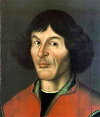 An interesting AP story is making the rounds this week, reporting that the Catholic Church has finally given due honors to Copernicus. Unfortunately the story is chock-full of statements that are severely misleading if not downright wrong. Start with the opening sentence… read more
An interesting AP story is making the rounds this week, reporting that the Catholic Church has finally given due honors to Copernicus. Unfortunately the story is chock-full of statements that are severely misleading if not downright wrong. Start with the opening sentence… read more
Britannia still rules the waves
Rian Malan | The Daily Telegraph
Natal was founded in the early 1840s by Sir Benjamin d’Urban on a stretch of elephant-infested bush. Some would say d’Urban stole the land from the Zulu kingdom, but the occupiers of record in 1843 were Boer Voortrekkers, who reloaded their ox wagons and headed back into the wild interior rather than submit to Queen Victoria. English-speaking Natalians heaved a sigh of relief and proceeded to turn their territory into a shrine to straight bats, and stiff upper lips. read more
Sarkozy’s arch rival Dominique de Villepin sets up rival party
conservativehome
 Dominique de Villepin, the eloquent opponent of the Iraq war and leader of the anti-Sarkozist centre-right in France, has set up a new political movement to bring the French right back to its sense. De Villepin used the launch to attack France’s involvement in the Afghan debacle, and Sarkozy’s decision to bring France back into the NATO military structure. ConservativeHome’s International section writes about the new movement with a sceptical eye. read more
Dominique de Villepin, the eloquent opponent of the Iraq war and leader of the anti-Sarkozist centre-right in France, has set up a new political movement to bring the French right back to its sense. De Villepin used the launch to attack France’s involvement in the Afghan debacle, and Sarkozy’s decision to bring France back into the NATO military structure. ConservativeHome’s International section writes about the new movement with a sceptical eye. read more
Amadeo Guillet
Obituary | The Daily Telegraph
 Daybreak on January 21, 1941: 250 horsemen erupted through the morning mist at Keru, cut through the 4/11th Sikhs, flanked the armoured cars of Skinner’s Horse and then galloped straight towards British brigade headquarters and the 25-pound artillery. At a distance of 25 yards they fired, cutting swathes through the galloping horses but also causing mayhem as the shells exploded amid the Sikhs and Skinner’s Horse. After a few more seconds the horsemen disappeared into the network of wadis that criss-crossed the Sudan-Eritrean lowlands. read more
Daybreak on January 21, 1941: 250 horsemen erupted through the morning mist at Keru, cut through the 4/11th Sikhs, flanked the armoured cars of Skinner’s Horse and then galloped straight towards British brigade headquarters and the 25-pound artillery. At a distance of 25 yards they fired, cutting swathes through the galloping horses but also causing mayhem as the shells exploded amid the Sikhs and Skinner’s Horse. After a few more seconds the horsemen disappeared into the network of wadis that criss-crossed the Sudan-Eritrean lowlands. read more
Are Czechs the least religious of all?
Dana Hamplová | guardian.co.uk
This claim is usually based on the sociological surveys and census data which show that only a small proportion of Czechs goes regularly to church and that most of the Czech Republic’s population does not report even a formal affiliation to any church. But the idea that Czechs are almost completely indifferent to any religion is not accurate. read more
Martin Gardner
IT’S ONE 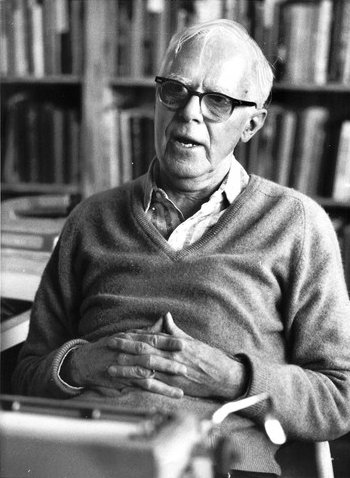 OF those strange things that I always automatically assume that anyone I know or have had dealings with cannot, by any stretch of the mind, be considered famous or well-known. The falseness of this assumption was made apparent to me when I picked up this week’s Economist after it arrived through the mail slot. As usual, there were a number of fascinating and well-informed articles, on the airlines of the Gulf, on the Colombian election, a special report on South Africa, and more. But then I finally reached the end pages and read the full page obituary of “Martin Gardner, man of letters and numbers,” who died on May 22nd at 95 years of age.
OF those strange things that I always automatically assume that anyone I know or have had dealings with cannot, by any stretch of the mind, be considered famous or well-known. The falseness of this assumption was made apparent to me when I picked up this week’s Economist after it arrived through the mail slot. As usual, there were a number of fascinating and well-informed articles, on the airlines of the Gulf, on the Colombian election, a special report on South Africa, and more. But then I finally reached the end pages and read the full page obituary of “Martin Gardner, man of letters and numbers,” who died on May 22nd at 95 years of age.
I never met Mr. Gardner but interacted with him several times during my New Criterion days by phone, and good old-fashioned post. He was a regular though not a frequent contributor to the magazine and was singular in that he was the only writer with whom the editor did not have the option of contacting via that nebulous mystery called the world-wide web. It was often, I confess, a source of some frustration that one would have all ones eggs in a row regarding pieces edited and signed off, and then there’d be something to do with Martin Gardner’s work and one would think “Blast! You mean I’ve got to stick this in an envelope to get the final OK?” Of course, when The New Criterion was founded, there was no internet, so there was a time when the whole magazine — indeed when every magazine — was put together via what I called the Martin Gardner method.
This aspect notwithstanding, it was always a pleasure working with Mr. Gardner, who was unfailingly polite over the phone when he would call in with his changes to our edits. It’s one of those inevitable aspects of death that one often discovers more interesting facts about the deceased than one ever knew while he was alive. In Martin Gardner’s case, it’s that this science maven published a number of annotated editions of works by G. K. Chesterton.
Roger Kimball writes of his last contact with Martin Gardner just a short time ago:
I wrote to tell him about the coincidence that a good friend now occupies the house he lived in for decades on Euclid Avenue (how’s that for an appropriate name?) in Hastings-on-Hudson, New York. I discovered this quite by accident. My wife and I were having dinner with a few other people at our friends’ house. I can’t remember Gardner’s name came up, but when it did I mentioned that he had lived for many years in Hastings-on-Hudson. “Yes,” said my friend, “and he lived in this very house.” One of the other couples present also knew Gardner. They recalled the time he invited them, shortly after they had moved to the neighborhood, to his house for drinks. Would it be alright if they brought their young children along, since no baby-sitter was available? Of course, nothing could be more agreeable! They arrived and Gardner proceeded to entertain the children with magic tricks for two hours.
My favourite story, however, is that he once wrote a devastating review of one of his own books and got it published under a pseudonym in the New York Review of Books. While he was a noted contributor to numerous sceptical reviews, he did come to a belief in God late in his life. “His declaration,” The Economist writes, “of this belief caused, he admitted, profound shock to those who knew him only as a sceptic. But there was too much playfulness in Mr Gardner to make him yield entirely to reason. His faith, he said, was based on an “emotional turning of the will”, unsupported by logic or science. It was his way, perhaps, of recognising that mind and man are not synonyms.”
Requiescat in pace.
Frederik van Zyl Slabbert, 1940–2010
FREDERIK VAN ZYL SLABBERT, former South African parliamentarian, politician, and briefly chancellor of Stellenbosch university, died last week in Cape Town. ‘Van’, as he was known, was convinced after a night of heavy drinking to stand as a parliamentary candidate for the Progressive Party in 1974 and won a surprise victory in the Rondebosch constituency against the United Party incumbent by 1,600 votes. Within three years he became head of the merged Progressive Federal Party, and became Leader of the Opposition in the House of Assembly in 1979.
Koos van der Merwe, currently Chief Whip of the Inkatha Freedom Party, served in parliament alongside the liberal van Zyl Slabbert while the former was still a member of the Conservative Party. “He was a parliamentarian par excellence,” van der Merwe said after Van’s death, “and I remember how once, in a mere three-minute speech, he practically annihilated P. W. Botha.”
Despite wide acclaim as one of the finest debaters in parliament, van Zyl Slabbert shocked the political establishment in 1986 by resigning because he was convinced that parliament had become irrelevant to the running of the country. His resignation nearly ruined the PFP and frayed van Zyl Slabbert’s relationship with his fellow MP, the late Dame Helen Suzman.
Just a year later he organised the first meetings between members of the banned African National Congress and a group of National Party politicians, Afrikaner academics, and businessmen. In later years he co-founded a black investment trust, was appointed chairman of the Johannesburg Stock Exchange, sat on the boards of a number of South African corporations, and worked for the Open Society Foundation. Van Zyl Slabbert was appointed Chancellor of the University of Stellenbosch — for whom he had played rugby as an undergraduate — in 2008 but resigned for health reasons a year later, and was succeeded by Johann Rupert.
Mr. van der Merwe continued:
What amazed me about Van Zyl Slabbert was the depth of his political knowledge and his wisdom. He knew and understood the policies of each political party better than they did themselves. On one occasion, at a seminar in Williamsburg in the U.S.A., I represented the Conservative Party and was confronted with questions I could not answer. I asked to be excused for a few minutes and went to van Van Zyl Slabbert and asked him how I, as a Conservative MP, should answer. He immediately gave me the right answers because he fully understood the views and beliefs of the Conservatives. And for that matter, each and every political party. He was in fact a mobile political library.
When the late Dr Treurnicht’s daughter approached Van Zyl Slabbert for assistance to move to the U.S.A. to marry a black man, Van Zyl Slabbert did not use that information against Treurnicht. At that stage, it was unthinkable for a white Conservative to marry a black man. News of Treurnicht’s daughter marrying a black man would have led to the end of Treurnicht’s political career. Van Zyl Slabbert confidentially told me the story but it never made the headlines. What an honourable man!
His part in the struggle for Afrikaans at Stellenbosch was indeed an eye opener. Where were the Verkramptes? The old Conservatives of which I was a member? Nowhere. The fight for Afrikaans was led by the “liberal jingoes” such as Van Zyl Slabbert, Hermann Giliomee, and Breyten Breytenbach. …
I also never once saw him angry.
Mooi loop, Van Zyl. Koos gaan jou mis.
Requiescat in pace.
Joyce Linton: The Lady with the Voice

Yesterday, in a beautiful sung requiem at St. Agnes, we paid our final respects to our friend Joyce Linton. I had known Joyce for quite some time before I ever actually met her because we tended to sit in the same neighborhood of pews (in the back of the church towards the left) at the 11 o’clock Mass at St Agnes every Sunday. While a schoolteacher by profession, she was also a trained vocal musician, and her voice carried as the congregation belted out our Credos and Glorias. She became known to me as “the Lady with the Voice”, and every so often I would see her making her way towards the church just before 11:00 and, without knowing her name, I would say to myself “That’s the Lady with the Voice”.
Eventually, I got to know Joyce well, and joined the regular tea-drinking crowd of which she was a devoted and prominent member. Vim. Moxie. Determination. Those are the words that come to mind when I think about Joyce, a spirited lady if ever there was one. But she was, also, a woman with a certain style. Think of 1950s New York, swanky, bright, and modern, but still traditional, and never out of date. That was Joyce.
Now, if there was one thing that undoubtedly went along with Joyce’s vim, moxie, and determination, it was that she had an opinion. She enjoyed a vibrant discussion and the interaction of ideas, but she made certain that even if you didn’t happen to share her opinion, you would at least be familiar with it. As it happens, Joyce and I were lucky enough to agree with one another on many things, but by no means all things. More than once did I attempt to refute her position on this, that, or another thing. After the back-and-forth had exhausted itself, she would say, “Well, I don’t think it’s quite as simple as that”, I would shrug my shoulders and say “Perhaps”, and we would sip our tea and rejoin the larger conversation.
She was a woman who was grateful for the graces in her life. She was grateful for the blessings of her family, though it was not without hardships. She was grateful for the magnificent inheritance of centuries of art and culture she was born on the receiving end of. She was a patriot if ever there was one — a proud American, but one with a devoted filial love of Europe, and especially of Italy.
I think the first time Joyce visited Italy was when she did her voice studies in Florence in the 1970s, and she never stopped going back. She had a devotion to Padre Pio and paid her respects to the great saint by pilgrimming to San Giovanni Rotondo. Towards the later years of her life she had a special love and appreciation for summer days spent at Gardone on the shores of Lake Garda, enjoying the intellectual stimulation of the annual summer symposium organized by the Roman Forum. The Italian airs invigorated her Celtic blood and she would return to New York in late summer rejuvenated and refreshed.
She always knew lots of things about New York. You can get great freshly baked bread here. They do a good brunch there. If you really want to do X, then you’ve got to Y at Z on Nth Street. I remember one drizzly November Sunday afternoon Joyce showed me “the best way to cut through Saks” as she and I made our way to the annual Choral Evensong & Flag Service for the Patriotic, Historical, and Hereditary Societies at the Church of St. Thomas, Fifth Avenue.
Joyce loved her job as a high school teacher at Manhattan Center on the Harlem River, just a few doors away from Our Lady of Mount Carmel on 115th Street. Any and all bureaucratic encroachments upon the teaching profession were vociferously opposed by her, and she had an enormous pride when her students did well (especially her girls). Latin was another excuse to spend time in Italy, where she studied the language under the famous Fr. Reggie Foster in Rome. She taught English as well, and was adamant that her students learn important lessons from writers like Orwell and Wilde, rather than a rote set of facts or ideas or quotes. She was always on the lookout for a new way of explaining the old truths to the students in her charge. She loved them, but she also loved her colleagues, and more than once had us praying for this one or that one.
When she was first diagnosed with cancer, many of us prepared ourselves mentally for The End. I think Joyce said to herself “Well I’m not having any of that.” She beat it the first time round (remember what I said about vim, moxie, determination?) to the surprise of many, probably her devoted doctor most of all. She went back to work, and her own hair grew back, allowing her to dispense with the peppy wig she had specially styled. Life, it seemed, returned to normal, for one last Halcyon day before the Hour approached. When the time did appear on the horizon, her descent was rapid. I’m glad I had a chance to see her one last time, surrounded as she was by friends in Lenox Hill Hospital.
Joyce would have loved her requiem, the priest in mournful black trimmed by resplendent gold, acolytes and torch-bearers aiding in the sanctuary, the Dies Irae rising from the choir loft, and those who knew and loved her pleading God’s mercy and quick remission of her earthly transgressions. It was beautiful — as the most beautiful things are — because it pointed towards that Heavenly place from whence our only glories come, where we pray “the Lady with the Voice” will enjoy perpetual light and rest eternal.
Requiescat in pace.
Amen.
Heaven in Herefordshire
In the weekly South African edition of the Telegraph, I came across a brief note marking the death of England’s oldest publican, Flossie Lane of ancient Leintwardine in Herefordshire. From the internet, I find the full version of her obituary, which is reproduced below. The Sun Inn, with its “Aldermen of the Red-Brick Bar” sounds like a splendid haven.
Flossie Lane, who died on June 13 aged 94, was reputedly the oldest publican in Britain, and ran one of the last genuine country inns
For 74 years she had kept the tiny Sun Inn, the pub where she was born in the pre-Roman village of Leintwardine on the Shropshire-Herefordshire border.
As the area’s last remaining parlour pub, and one of only a handful left in Britain, the Sun is as resolutely old-fashioned and unreconstructed today as it was in the mid-1930s when she and her brother took it over.
According to beer connoisseurs, Flossie Lane’s parlour pub is one of the last five remaining “Classic Pubs” in England, listed by English Heritage for its historical interest, and the only one with five stars, awarded by the Classic Basic Unspoilt Pubs of Great Britain.
She held a licence to sell only beer – there was no hard liquor – and was only recently persuaded to serve wine as a gesture towards modern drinking habits.
With its wooden trestle tables, pictures of whiskery past locals on the walls, alcoves and a roaring open fire, the Sun is listed in the CAMRA Good Beer Guide as “a pub of outstanding national interest”. Although acclaimed as “a proper pub”, it is actually Flossie Lane’s 18th-century vernacular stone cottage, tucked away in a side road opposite the village fire station.
There is no conventional bar, and no counter. Customers sit on hard wooden benches in her unadorned quarry-tiled front room. Beer – formerly Ansell’s, latterly Hobson’s Best at £2 a pint – is served from barrels on Flossie Lane’s kitchen floor. (more…)
Argentina Mourns an Honest Man

RAÚL ALFONSÍN WAS often a stumbling, bumbling leader when he served as President of the Argentine Republic but, in a country of rampant corruption and abuse, his personal integrity was unassailable. It was probably for that reason that Argentines came on to the streets of Buenos Aires in April to mourn the loss of, certainly not the greatest statesman of the country’s history, but at least something simple: an honest man. For more on the late president, see my piece over at InsideCatholic.com. (more…)
Lumsden Requiem in Edinburgh
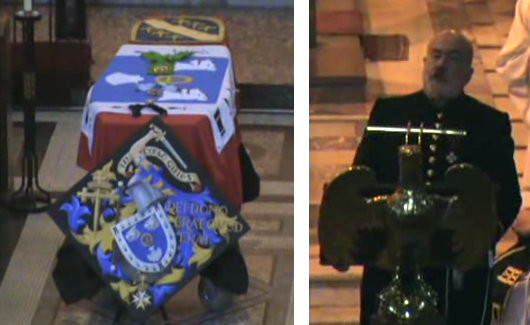
Some good Christian soul was kind enough to put most of our friend David Lumsden‘s funeral at St. Mary’s (Catholic) Cathedral in Edinburgh on YouTube. It was the first Latin requiem in the extraordinary form of the Mass held in the Cathedral for many decades — a fact which David would have particularly enjoyed. Of note is the address given by Robin Angus, embedded below, and of course Gerald Warner’s previously mentioned report should not be missed either.
‘Feudal pomp and Latin Mass at funeral of a Scottish laird’
Gerald Warner reports on the funeral of David Lumsden of Cushnie:
Thursday, September 11, 2008
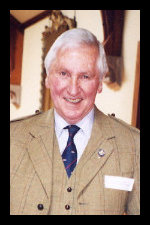 To Edinburgh yesterday, for a melancholy but magnificent and uplifting occasion: the funeral of David Lumsden of Cushnie, Garioch Pursuivant of Arms, restorer of ancient castles and Jacobite romantic. It was held in the Catholic cathedral where, for the first time since Vatican II, the Latin Tridentine Mass was sung, thanks to the permissive rules of Benedict XVI in his motuproprio Summorum Pontificum.
To Edinburgh yesterday, for a melancholy but magnificent and uplifting occasion: the funeral of David Lumsden of Cushnie, Garioch Pursuivant of Arms, restorer of ancient castles and Jacobite romantic. It was held in the Catholic cathedral where, for the first time since Vatican II, the Latin Tridentine Mass was sung, thanks to the permissive rules of Benedict XVI in his motuproprio Summorum Pontificum.
The coffin was draped in the banners of the Order of Malta and the deceased’s arms, with an heraldic hatchment and the decorations of the orders of chivalry to which he belonged. Knights of Malta and of the Constantinian Order processed behind their banner in mediaeval robes. The congregation was filled with peers, chieftains, lairds and splendid eccentrics, the pews awash with tartan. One of the tail-coated ushers was the grandson of a papal marquis. Robin Angus, whose day job is venture capitalist, dressed in the uniform of a papal Knight of St Sylvester, delivered a moving panegyric.
This occasion was a potent reminder of an alternative Scotland, a different pulse from the vulgar, mean-minded, politically correct clones in the abysmal Scottish parliament at Holyrood. It was shamelessly feudal, aristocratic and colourful. Evelyn Waugh would have loved it; Harriet Harridan would have burst her stays. It was reminiscent of the scene in Waugh’s Sword of Honour when, at the funeral of old Mr Crouchback, the members of ancient Catholic Recusant families murmur their sonorous names while the narrator, parodying a wartime poster, concludes: “Their journey was really necessary.”
At the subsequent reception, Lady Mar, whose personal herald David was and who came top of the ballot for the 92 surviving hereditary peers in the House of Lords, was pointedly addressed by Jacobites as “Your Grace”. This was because, although the British state recognises her as 30th Countess of Mar, her ancestor who led the Jacobite Rising of 1715 was created Duke of Mar by the exiled Stuart King James VIII.
Only a few of these Jacobite peerages created by the Stuarts in exile have heirs today. Now that such hereditary peerages no longer bestow an automatic seat in Parliament, it would be a gracious gesture for the Crown to recognise them and so heal old historical wounds. There is a precedent: Spain has recognised the titles of nobility created by the Carlist claimants in exile – Carlism being the Spanish equivalent of Jacobitism.
The dry-as-dust forms issued by government departments are normally very boring; but the most romantic document available online is issued by the Spanish Ministry of Justice, entitled Solicitud de Titulo Nobiliario por: Rehabilitacion/Reconocimiento de Titulo Carlista. It is the formal application for recognition of a title of nobility conferred by the Carlist kings in exile from 1833 to 1936. David Lumsden of Cushnie (RIP) would have appreciated it.
David Lumsden of Cushnie, 1933-2008
Garioch Pursuivant of Arms, sometime Baron of Cushnie-Lumsden, Knight of Malta, Patron of the Aboyne Highland Games

It was with great sadness that I learned this morning of the death of David Lumsden. He was an exceptionally genial and affable man, and was relied on to provide good company at many events, from balls to Sunday lunches and everything in between. But David was generous not only with his good company but with his patronage, as is attested to by the countless organizations he helped and guided. Here was a man who was generous of spirit. David’s death came very suddenly yesterday afternoon in his hotel room at the annual conference of the 1745 Association, of which he was president. Just last Sunday he had attended the traditional Mass at St. Andrew’s, Ravelston in Edinburgh, where a friend described him as “looking as hale and hearty as ever”.
David Gordon Allen d’Aldecamb Lumsden of Cushnie, sometime Baron of Cushnie-Lumsden, was born on 25 May in 1933 in Quetta, Baluchistan in the Empire of India. He was the son of Henry Gordon Strange Lumsden, a Major in the Royal Scots, of Nocton Hall, Lincolnshire and Sydney Mary, only child of Brigadier-General Charles Allen Elliot.
He was educated at Allhallows, Devon, Bedford School, and at Jesus College, Cambridge before serving in the Territorial Army with the London Scottish while working at British American Tobacco. He was a Knight of the Order of Malta, as well as of the Constantinian Order, and was Patron of the Aboyne Highland Games. David enthusiastically served as Garioch Pursuivant to the Chief of the Name and Arms of Mar (presently Margaret of Mar, the 30th Countess of Mar), one of the four surviving private officers of arms in Scotland recognised by the Court of the Lord Lyon.

Lumsden with friends, at the Aboyne Highland Games.
David co-founded the Castles of Scotland Preservation Trust and the Scottish Historic Organs Trust and was President of the Scottish Military History Society. In addition to his Magister Artium from Cambridge, he was a Fellow of the Society of Antiquaries of Scotland. He was on the council of The Admiral the Viscount Keppel Association and was one of the patrons of the famous Russian Summer Ball in London. He was Convenor of the Monarchist League of Scotland and was on the council of the Royal Stuart Society.
In the realm of sport, he was a keen shot and had rowed at Cambridge, in addition to his interest in sailing and riding.
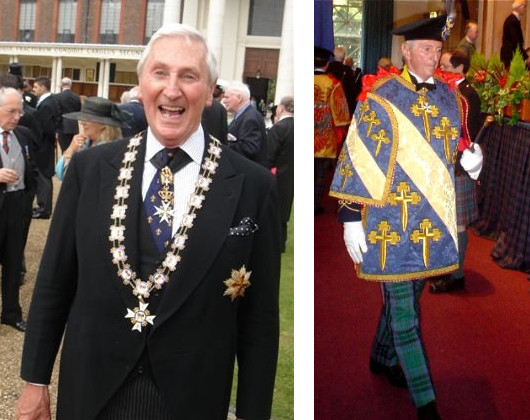
Left: Representing the Royal Stuart Society at the Henry IX commemoration at the Royal Hospital Chelsea. Right: In his capacity as Garioch Pursuivant of Arms, at the XXVIIth International Congress of Genealogical and Heraldic Sciences in 2006.
David had a passion for architecture, and especially that of his native Scotland. Returning in 1970 after a spell in Africa, he undertook the restoration of two family properties: Cushnie House, built in 1688 by Alexander Lumsden and Tillycairn Castle, built in 1540 by Matthew Lumsden. He later went on to restore Leithen Lodge at Innerleithen, an 1880s shooting lodge built in a distinctly Scottish take on the Arts & Crafts tradition. Under the auspices of the Castles of Scotland Preservation Trust, in 1994 he oversaw the restoration of Liberton Tower just south of the Royal Observatory in Edinburgh.
“David was a unique man possessed of an insatiable love of life and learning,” his friend Rafe Heydel-Mankoo said. “He will be deeply missed and fondly remembered by those fortunate enough to have met him.”
“David was at the centre of so many things, and brought together so many different people,” said Lorna Angus, the wife of Robin Angus. “He could bring life to any gathering and he made so many good things possible.”
Robin Angus, meanwhile, said that David Lumsden “personified a world of precious things — things which are imperilled, but which never seemed imperilled when he was there.”
“David no longer visibly with us is unimaginable,” Robin continued. “What his friends must now do is keep the flame, and — as he did — pass it on to others with the same generous wisdom. He was the soul of old Scotland. I hope that, in Heaven, Raeburn will make amends for what the centuries did not allow, and paint his portrait.”
While I wholeheartedly agree with Robin, it must be said that those who were blessed to know David are left with a portrait of him in our hearts and minds far greater than even the brush of Raeburn could achieve.
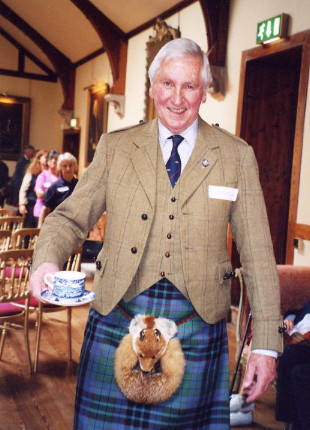
David Gordon Allen d’Aldecamb Lumsden
of Cushnie
1933–2008
“… hold fast to that which is good.”
— 1.Thess 5:21
Requiem aeternum dona eis Domine:
et lux perpetua luceat eis.
Requiescat in pace.
Alexander Solzhenitsyn, 1918–2008
Russian traditionalist, Nobel laureate, feted in the West for criticism of Soviet Communism, then spurned for rejecting liberal materialism

Alexander Isayevich Solzhenitsyn, the most famous Russian writer and historian of our age, has died at eighty-nine years of age. Solzhenitsyn was the earliest to bring first-hand knowledge of the Gulag, the Soviet system of prison colonies and labour camps, to wider Western attention. For this noble task, he was awarded the Nobel Prize for Literature in 1970 and expelled from the Soviet Union four years later, returning in 1994. After the fall of the Soviet regime, he despised Boris Yeltsin’s incompetence, identifying 1998 as the low point of Russia’s recent history. “Yeltsin decreed I be honored the highest state order,” Solzhenitsyn explained. “I replied that I was unable to receive an award from a government that had led Russia into such dire straits.”
He gave cautious support to the presidency of Vladimir Putin, and was pleased that while, in his words, “Moscow is still communist”, there was a growing readiness under Putin to admit (and even broadcast on state television) the crimes and outrages of the Soviet regime.
“Putin inherited a ransacked and bewildered country, with a poor and demoralized people. And he started to do what was possible — a slow and gradual restoration. These efforts were not noticed, nor appreciated, immediately. In any case, one is hard pressed to find examples in history when steps by one country to restore its strength were met favorably by other governments.”
Influenced by his experience in exile in both Switzerland and New England, Solzhenitsyn insisted on the need for local self-government in Russia. “Today I continue to be extremely worried by the slow and inefficient development of local self-government. But it has finally started to take place. In Yeltsin’s time, local self-government was actually barred on the regulatory level, whereas the state’s ‘vertical of power’ (i.e. Putin’s centralized and top-down administration) is delegating more and more decisions to the local population. Unfortunately, this process is still not systematic in character.”
Solzhenitsyn expressed further disappointment with the new Western imperialism being waged against Russia, embodied in the 1999 War against Serbia which turned so many Russian minds against the Western powers they had previously been quite friendly to.
In a recent interview with Der Spiegel, Solzhenitsyn was asked whether he was afraid of death:
“No, I am not afraid of death any more. When I was young the early death of my father cast a shadow over me — he died at the age of 27 — and I was afraid to die before all my literary plans came true. But between 30 and 40 years of age my attitude to death became quite calm and balanced. I feel it is a natural, but no means the final, milestone of one’s existence.”
When the interviewer from Der Spiegel wished him many more years of “creative life”, Solzhenitsyn calmly responded “No, no. Don’t. It’s enough.”
Fred Henzer
What can one say about Fred Henzer? Fred was a man of some contradictions. The very first time I ever met him, back in high school (it seems eons ago), he tried to beat the living daylights out of me because I had mistaken him for a particular enemy of his. Luckily for me he was restrained by his friends (indeed, my friends) who vouched for me and urged him to forget such an innocent error. I didn’t think much of him and made a mental note not to get involved with such a character. But of course it was hard not to come across Fred often if you were born in 1984 and hung around Bronxville. Our introductory incident was quickly forgotten and we soon became friends (though admittedly never close), mostly because we had friends in common.
Fred was charming without being a cad. It was no doubt why and how, despite his many flaws, he managed in those days to have a girlfriend as pretty and immediately endearing as Alana (who flew across the country to attend his funeral today — her birthday). And while his friends were his friends (and indeed being his friend was something that mattered to Fred), he did have his enemies as well — more out of pride and anger, I think, than out of a genuine hate.
He was an inveterate moocher. Of course the man whom he mooched off of the most was Frank Powers. Frank, without a doubt the most respected and admired man of those our age in Westchester, was probably the best friend he ever had, but as Frank said when once asked of Fred, there’s only so much you can do for a friend.
Fred found some of the slight restrictions the rest of us take for granted quite irritating, and sometimes he in turn became an irritation to others because of it. I remember once driving back from some party or gathering at 2:00 in the morning when we stopped at a red light. Sitting in the passenger seat, he found the red light unbearable and begged me to pass through it, there was no one behind us, nor in front of us, not a single car in sight, he pleaded. No one would notice, it wouldn’t hurt a fly, just run this light! But I was as stubborn as he, and it was not long before it turned green anyhow and he shut up.
But his flaws were always excused, weren’t they? He was Fred after all. In hindsight, there is an obvious and quick temptation to call ourselves to account for his ultimate downfall. Could we have done more for him? Were we too tolerant? Too forgiving? Couldn’t we have somehow intervened? I doubt it. Fred was his own master. He made his own decisions; he made good ones and he made poor ones, but they were his. As Frank (who would know more than anyone else) said, there’s only so much you can do.
His end did not come as a surprise to those who knew him, but this does not negate the tragedy of his death, and indeed his life. We must restrain ourselves from romanticizing the life and death of an addict. It was undignified. Fred was a human being — a son, a brother, a friend — he deserved better. It is saddening that someone as vivacious and lively and indeed loving as Fred did not have enough of that most necessary love, the love of life, to keep himself in order and his bad habits in check.
What has he left us in this world? Bits of laughter and hilarity, some very amusing times, moments of lightness and indeed even wit, too many to even attempt to record here. These may sound like light and ephemeral things, but there was an underlying goodness to Fred that animated them, and it is that underlying goodness that I hope we will all recall in years to come when our minds turn back to the man we used to know, Fred Henzer.
We will remember him.
1984-2008
Requiem aeternum dona eis Domine:
et lux perpetua luceat eis.
Requiescat in pace.
Philipp Freiherr von Boeselager, 1917-2008
Catholic Nobleman, Forester, Knight of Malta, Plotted to Kill Hitler

Philipp Freiherr (Baron) von Boeselager, the last surviving member of the conspiracy of anti-Nazi German officers, has died at 90 years of age. The freiherr‘s background and upbringing were distinctly Catholic. The Boeselagers are a Rhenish family with Saxon origins in Magdeburg. Philipp was the fourth of eight children and was educated by the Jesuits at Bad Godesborg. His grandfather had been officially censured by the Imperial German goverment for publically taking part in a Catholic religious procession.
Boeselager had most intimately been involved in the March 1943 plot to assasinate Hitler and Himmler when the the Fuhrer and the SS head were visiting Field Marshal Günther von Kluge on the Eastern Front. Boeselager, then a 25-year-old cavalry lieutenant under the Field Marshal’s command, was to shoot both Hitler and Himmler in the officers mess with a Walther PP. Himmler, however, neglected to accompany Hitler and so the Field Marshal ordered Boeselager to abort the attempt fearing that Himmler would take over in the event of Hitler’s death, changing nothing.
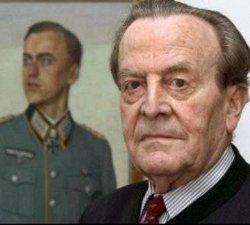 «Each day Hitler ruled, thousands died unnecessarily — soldiers, because of his stupid leadership decisions. And later, I learned of concentration camps, where Jews, Poles, Russians — human beings — were being killed.»
«Each day Hitler ruled, thousands died unnecessarily — soldiers, because of his stupid leadership decisions. And later, I learned of concentration camps, where Jews, Poles, Russians — human beings — were being killed.»
«It was clear that these orders came from the top: I realised I lived in a criminal state. It was horrible. We wanted to end the war and free the concentration camps.»
Boeselager later procured the explosives for the famous July 1944 plot (the subject of the upcoming film “Valkyrie“), under the cover of being part of an explosives research team. He handed a suitcase with the explosives on to another conspirator. When the bomb exploded in Hitler’s conference room, Boeselager and his 1,000-man cavalry unit made an astonishing 120-mile retreat in under 36 hours to reach an airfield in western Russia from where the aristocrat would fly to Berlin to join the other conspirators.
At the airfield, however, he received a message from his brother (Georg von Boeselager, a fellow cavalry officer who was repeatedly awarded for his consistent bravery on the battlefield) saying “All back into the old holes”, the code signifying the failure of the coup. Even more astonishingly than his swift retreat was his return, with his unit, to the front quickly enough not to raise any eyebrows. As a result, he was not known to be part of the conspiracy and escaped the gruesome tortures and executions dealt to many of his fellow conspirators.
After the war, his role in the plot was revealed and Philipp von Boeselager was awarded the Legion d’honneur by France and the Great Cross of Merit by West Germany. He joined the Order of Malta in 1946, eventually co-founding Malteser Hilfdienst, the medical operation of the German knights of the Order, and helping coordinate German pilgrimages to Lourdes.
The greater part of his post-war years was spent in forestry, and Boeselager served as head of the Arbeitsgemeinschaft Deutscher Waldbesitzerverbände (the coordinating body of private and cooperative forest-owners) from 1968 to 1988. Coincidentally, he was succeeded in that post by Franz Ludwig Schenk Count von Stauffenberg, the son of the July ’44 plot mastermind.
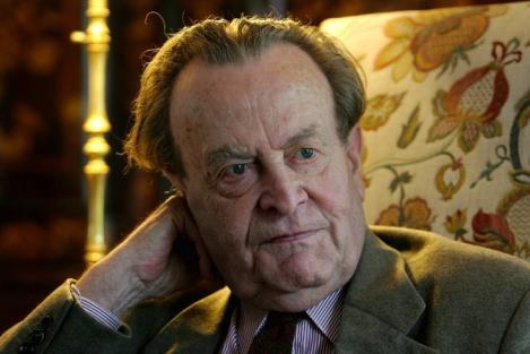
Search
Instagram: @andcusack
Click here for my Instagram photos.Most Recent Posts
- Burns Tower April 19, 2024
- Patrick in Parliament March 18, 2024
- Articles of Note: 13 March 2024 March 13, 2024
- Cambridge March 9, 2024
- Taken on Trust March 4, 2024
Most Recent Comments
Book Wishlist
Monthly Archives
Categories


